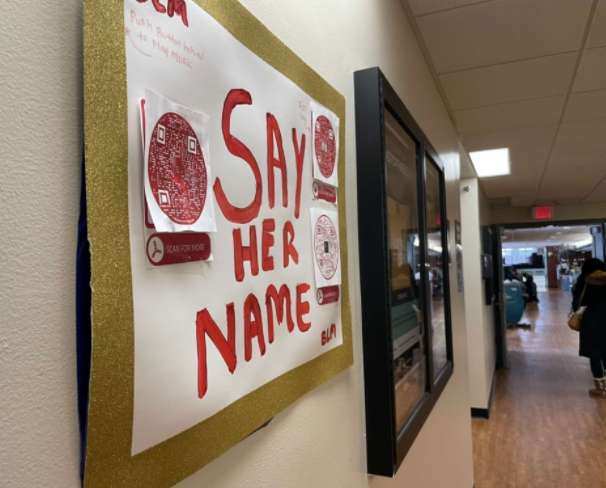
Picture by MJ Soria
Breonna Taylor’s death in March of 2020 was met with global frustration. Her wrongful death inspired millions around the nation, and the world, to advocate for Black lives and speak out against police brutality. Today, you might see her face painted on sides of buildings or even on a basketball court in Annapolis, Maryland. Taylor’s death was one of many pivotal moments for Black Lives Matter in 2020, but her story is not unique.
In 2020, The Washington Post reported that 250 Black women have been fatally shot by police since 2015, and yet, Black women killed at the hands of police often seem to be an afterthought. Their stories are not nearly as widespread and known as their male counterparts. This disparity in awareness and commemoration is something that Janelle Monae attempted to combat in her 2021 song “Say Her Name.” When senior nursing major Monischa Hills first heard the song, they were instantly inspired. They remembered thinking “Oh my gosh, I want to put together something for that,” and they instantly got to work.
During the 17 minute song, Monae, and other featured artists and leaders, chant the names of 50 Black women and girls who have been killed. The chorus pleads listeners to do just as the title suggests: “say her name.”
After hearing the song, it took Hills about two weeks to assemble a poster describing the song and many more with photos of the fallen women. Hills wanted students to see the faces of the Black women too often forgotten, and “put the QR code on the poster so people can learn more about their stories.”

Hills displayed their work in the hallway leading up to Dugout. It hung there for the remainder of the fall semester. They also posted the project on Facebook and Instagram to reach larger crowds online, not just IWU students.
When asked why Hills made such a great effort to put this together, Hills said that they wanted people to know and be reminded that Black women are also being killed.
Hills noted that chants of Black Lives Matter are usually in response to deaths of Black men and that “a lot of times Black women and girls, and especially trans women, are forgotten.”
After all, Hills recounted, “women are behind these movements. The Black Lives Matter movement was literally created by two women. They’re the founders of the organization.”
As people walked into Dugout, they were deeply impacted by the display Hills set up. They recall both students and staff approaching them to say, “Mo, I’ve seen your display and I was so moved by it.” Hills said that though many people didn’t have time to read everything at the time, they’d go back and read more later. Hills was surprised by the number of inspired people who approached them. They were even approached by the local newspaper, The Pantagraph.
“So now even more people have read about it, which is great because I want more people to see the work that’s being done; not because it’s my work, but because it’s something that needs to be seen. We need to humanize these people.”
Hills’s agency and initiative is no surprise to those who have heard of them on campus. Hills is a very active leader, whose activities include serving as President of Amnesty International, Social Media Chair for Black Student Union, and Pride Alliance.
Hills has been an outspoken advocate for change on campus throughout their years. Currently, they are working alongside others to create a Multicultural Center that might provide students of color a safe space to find community. Hills explained that “currently the only safe space is unofficially ODI [Office of Diversity and Inclusion]. BSU is working on a Multicultural Center so that people of different ethnicities can just be there and feel safe and have resources.”
They feel the project is incredibly important to the IWU community and could have a great impact on students of color. They said that “creating safe spaces should be a priority on campus because a lot of students I talk to feel unwelcome here for many different reasons.”
In September of 2020, the Instagram account @bipocatiwu was created to give IWU students, faculty and staff a place to speak about their experiences at IWU as people of color. In April 2021, posts from the account were displayed on the quad. One of the posters told any passerby that people of color on campus were tired of acting as IWU’s advertisement. Hills echoed the posters’ sentiment and said that IWU should work on “having more people who look like us, and not just for numbers.”
Facing graduation in May, Hills says they want to be remembered as someone who tried to enact change and wasn’t afraid to speak out. Hills’s advice to students is indicative of their legacy to be left at Wesleyan: “be bold.”

